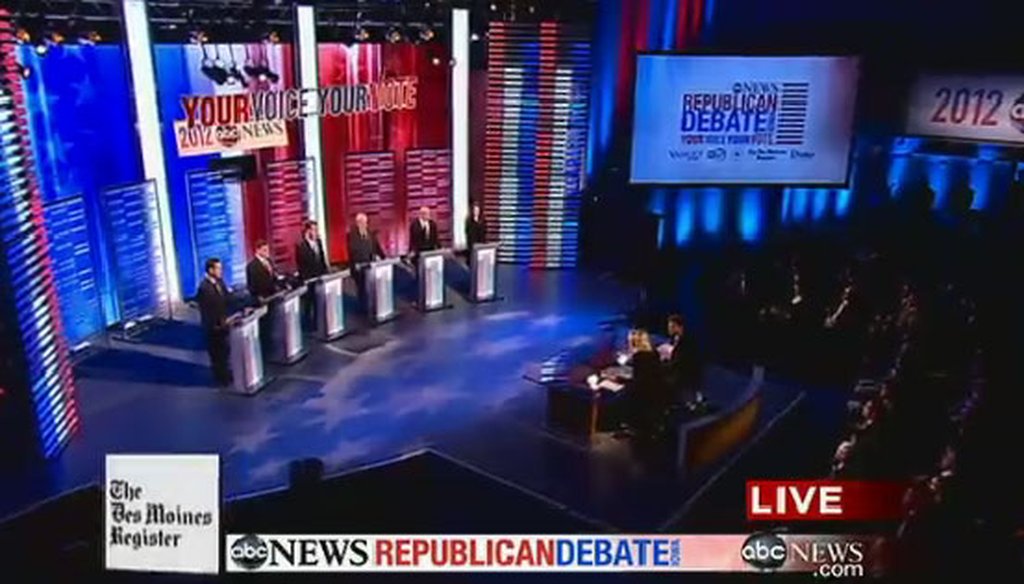Stand up for the facts!
Our only agenda is to publish the truth so you can be an informed participant in democracy.
We need your help.
I would like to contribute

The Republican presidential candidates debated Saturday night in Iowa.
The Republican candidates discussed the economy, immigration -- and a $10,000 bet -- at a debate at Drake University in Des Moines on Dec. 10, 2011.
Rep. Michelle Bachmann introduced a new character to the debates, attacking "Newt Romney" for supporting cap and trade. Former Republican House Speaker Newt Gingrich refuted Bachmann, saying, "I have never -- I oppose cap and trade ... It is simply untrue."
We checked Gingrich when he said almost the same thing at a candidates' forum in New York Dec. 3, 2011. We found that Gingrich has not been consistent on the issue. Four years ago, he was singing the praises of cap and trade -- as long as tax incentives were included in new laws. His views have shifted since then, but we found Gingrich's claim that he never supported cap and trade to be False.
Bachmann also said that Gingrich first backed an individual mandate in health care in 1993 and did so again as recently as May, 2011. We found that Gingrich had advocated for individuals "being required to have health insurance," in a 1993 interview, though he expressed flexibility on the details, and that he said in May, 2011 that "we ought to have some requirement that you either have health insurance or you post a bond." We rated Bachmann's statement Mostly True.
Bachmann also said that she wants to make sure that everyone pays taxes, "Because today 47 percent of the American people pay nothing in federal income tax."
Sign up for PolitiFact texts
We've checked similar statements before, including one by House Majority Leader Eric Cantor, R-Va., and rated them True. In that fact-check, we found that the Urban Institute's and Brookings Institution's joint Tax Policy Center projected 47 percent of people would pay no income tax in 2009, largely due to additional tax credits through the American Recovery and Reinvestment Tax Act of 2009. Some low-income filers receive receive a refundable tax credit designed to encourage them to work. Other filers benefit from popular lower- and middle-income breaks such as child credits and mortgage interest deductions.
As for the bet, Rick Perry should be glad he didn't take it. The bet was over Perry's claim that former Massachusetts Gov. Mitt Romney, in his book No Apology, called his state's health care law "the model for the country," including its individual mandate that people buy health insurance, but that he deleted that from a later version of the book. We found that Perry was right that Romney's comments about health care were edited between editions but that Romney was consistent in his argument for state-level solutions to health care, and rated Perry's statement Mostly False.
We also examined Bachmann's claim that when Romney was governor of Massachusetts, he "put into place socialized medicine." We fact-checked that one and the meter burst into flames.
Back to Gingrich, he also said in the debate that "an entry level janitor gets paid twice as much as an entry level teacher'" That led to a flurry of requests from readers to fact-check whether that was accurate. It wasn't. Starting salaries for highly qualified custodial engineers make somewhat more than entry level teachers without a graduate degree (not twice as much), but cleaners, who would be entry level janitors make less than starting teacher, with or without a degree. So we ruled that False.
Romney said that "only one president has ever cut Medicare for seniors in this country and it's Barack Obama." We assumed that he was talking about the 2010 health care reform law that, among other things, reduces future Medicare spending by $500 billion. They aren't cuts in the current budget, and they don't reduce benefits. And on top of that, other presidents have cut Medicare in different ways, including reducing benefits. We ruled it False.
Our Sources
The debate.

















































